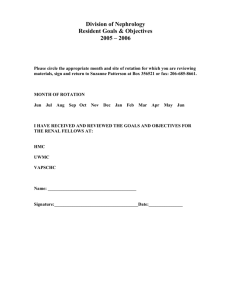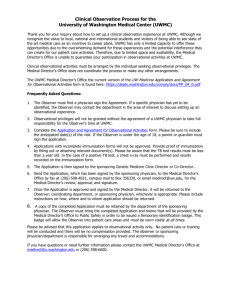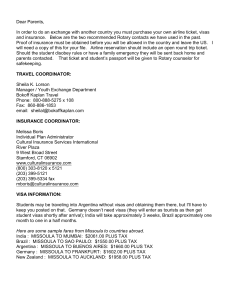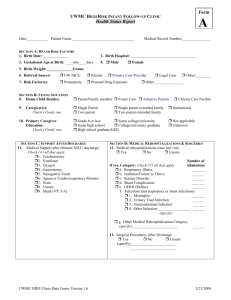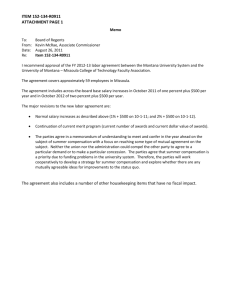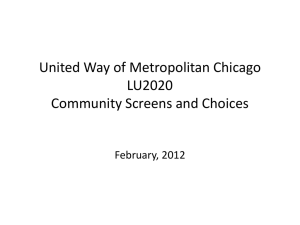Communication Policy - United Way of Missoula County
advertisement
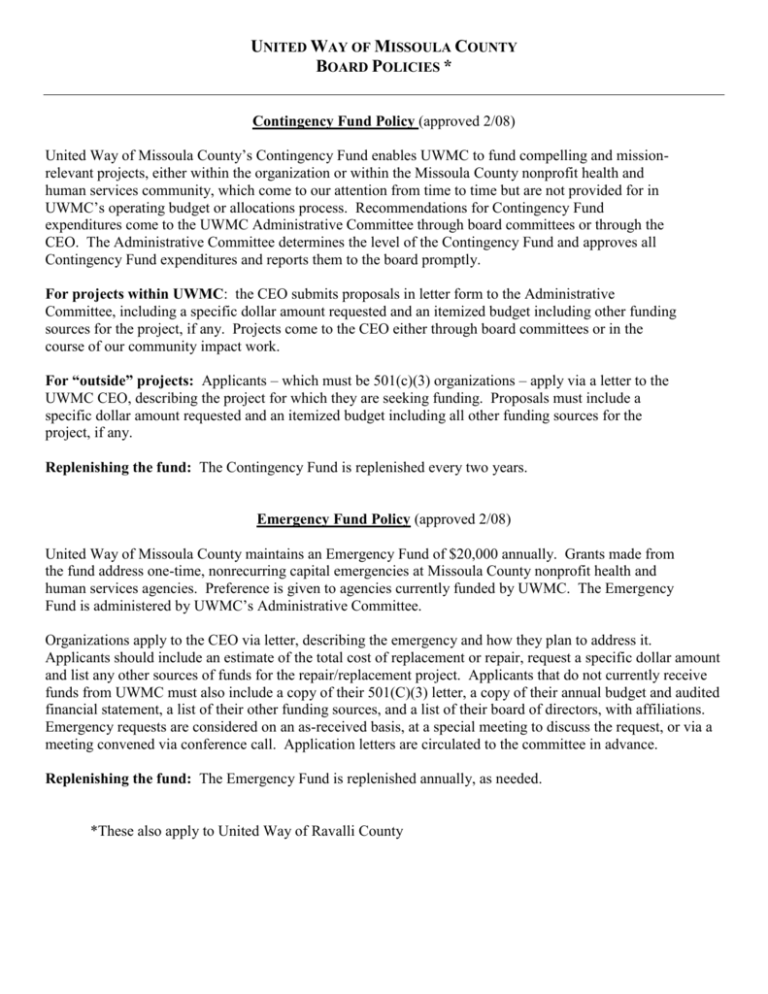
UNITED WAY OF MISSOULA COUNTY BOARD POLICIES * Contingency Fund Policy (approved 2/08) United Way of Missoula County’s Contingency Fund enables UWMC to fund compelling and missionrelevant projects, either within the organization or within the Missoula County nonprofit health and human services community, which come to our attention from time to time but are not provided for in UWMC’s operating budget or allocations process. Recommendations for Contingency Fund expenditures come to the UWMC Administrative Committee through board committees or through the CEO. The Administrative Committee determines the level of the Contingency Fund and approves all Contingency Fund expenditures and reports them to the board promptly. For projects within UWMC: the CEO submits proposals in letter form to the Administrative Committee, including a specific dollar amount requested and an itemized budget including other funding sources for the project, if any. Projects come to the CEO either through board committees or in the course of our community impact work. For “outside” projects: Applicants – which must be 501(c)(3) organizations – apply via a letter to the UWMC CEO, describing the project for which they are seeking funding. Proposals must include a specific dollar amount requested and an itemized budget including all other funding sources for the project, if any. Replenishing the fund: The Contingency Fund is replenished every two years. Emergency Fund Policy (approved 2/08) United Way of Missoula County maintains an Emergency Fund of $20,000 annually. Grants made from the fund address one-time, nonrecurring capital emergencies at Missoula County nonprofit health and human services agencies. Preference is given to agencies currently funded by UWMC. The Emergency Fund is administered by UWMC’s Administrative Committee. Organizations apply to the CEO via letter, describing the emergency and how they plan to address it. Applicants should include an estimate of the total cost of replacement or repair, request a specific dollar amount and list any other sources of funds for the repair/replacement project. Applicants that do not currently receive funds from UWMC must also include a copy of their 501(C)(3) letter, a copy of their annual budget and audited financial statement, a list of their other funding sources, and a list of their board of directors, with affiliations. Emergency requests are considered on an as-received basis, at a special meeting to discuss the request, or via a meeting convened via conference call. Application letters are circulated to the committee in advance. Replenishing the fund: The Emergency Fund is replenished annually, as needed. *These also apply to United Way of Ravalli County Diversity Statement As a human service organization continuously seeking to deliver community impact and maintain quality service to our donors and clients, the United Way of Missoula County places high value on the concept of diversity. United Way of Missoula County values the uniqueness of the individual, the power of the collective good and the importance of communities. We promote a climate that welcomes, understands and respects the diversity of our clients, donors, staff, volunteers, agencies and community partners. Dimensions of diversity include but are not limited to race, ethnicity, cultural orientation, national origin, sexual orientation, language, religious belief, disability, gender and age. United Way of Missoula County is committed to incorporating practices that enhance diversity into all areas of activity, including the recruitment and retention of staff and volunteers from diverse backgrounds. Staff and volunteers are supported through training to address the needs of all individuals and communities served. The Board of Directors and senior management team will provide leadership and collaborate with clients, donors, staff, volunteers, agencies and community partners to ensure an environment that values diversity. Nondiscrimination Policy United Way of Missoula County (UWMC) is committed to a policy of nondiscrimination based on race, creed, religion, color, national or ethnic origin, age, physical or mental disability, marital status, sex or sexual orientation. UWMC and the agencies it helps support depend upon the goodwill and contributions of all citizens. UWMC cannot survive in a climate of controversy or divisiveness. UWMC appeals to those involved in major local or national conflicts to keep UWMC free from involvement in potentially divisive controversies because of risk or harm to the greater community if proponents of either side of such issues were to use UWMC as a means to foster their viewpoints. Sexual Harassment Policy Sexual Harassment includes unwelcome verbal or physical conduct of a sexual nature when: Submission to or rejection of the conduct is implicitly or explicitly made a term or condition of employment, or is used as the basis for an employment decision affecting the employee. The conduct has the purpose or effect of unreasonably interfering with an employee’s work performance or creating an intimidating, hostile, or offensive working environment. Examples of prohibited sexual harassment include, but are not limited to propositions or pressure to engage in sexual activity or assault, repeated intentional body contact, sexual jokes, innuendoes, or comments, staring or leering, display or distribution of any materials with a sexual connotation, a pattern of hiring or promoting sex partners over more qualified persons, or any harassing behavior directed toward a person because of the person's gender. Sexual harassment of employees, volunteers, or agency partners will not be tolerated. Any employee who is the subject of, who has knowledge of, or who witnesses any possible prohibited harassment or discrimination has a responsibility to immediately bring such information to the attention of their supervisor or a Principal of the Personnel Committee. Anyone who receives a report of alleged harassment or discrimination must immediately notify the Director of Operations, who is also responsible for personnel matters, or a Principal of the Personnel Committee. United Way pledges to promptly investigate concerns regarding prohibited harassment and discrimination and, where appropriate, take corrective action. Complaints will be kept confidential to the maximum extent possible that still allows investigation and, if necessary, discipline. United Way will determine the steps to be taken balancing the rights of the alleged victim, including the severity of the alleged conduct, and the rights of the alleged harasser. Neither United Way nor any of its employees will retaliate against any employee for filing a complaint or for participating in the investigation of any complaint. Travel Policy It is the policy of UWMC to pay the actual hotel costs with receipts, per diem for meals, actual costs of air transportation and current IRS approved rate for mileage, for all trips made on behalf of UWMC. Per Diem rates are based on those of the federal government. Workplace Harassment and Workplace Violence Policy United Way is committed to providing a working environment where all employees and members are treated with courtesy, dignity, and respect. We will therefore not tolerate or condone any actions by anyone that constitute any form of harassment, including sexual harassment, of our employees. We will likewise not tolerate any action of violence against anyone in the workplace. Whistleblower Policy Purpose The objectives of United Way of Missoula County’s Whistleblower Policy are to establish policies and procedures for: the submission of concerns regarding questionable accounting or auditing matters by employees, directors, officers, and other stakeholders of the organization, on a confidential and anonymous basis. The receipt, retention, and treatment of complaints received by the organization regarding accounting, internal controls, or auditing matters. the protection from retaliatory actions of directors, volunteers and employees reporting concerns. Reporting responsibility Each director, volunteer, and employee of United Way of Missoula County has an obligation to report, in accordance with this Whistleblower Policy 1. questionable or improper accounting or auditing matters, and 2. violations and suspected violations (hereinafter collectively referred to as Concerns) of United Way of Missoula County’s Code of Ethics. Authority of Administrative Committee All reported Concerns will be forwarded to the Administrative Committee in accordance with the procedures set forth herein. The Administrative Committee shall be responsible for investigating, and making appropriate recommendations to the board of directors, with respect to all reported Concerns. No Retaliation This Whistleblower Policy is intended to encourage and enable directors, volunteers, and employees to raise Concerns within the organization for investigation and appropriate action. With this goal in mind, no director, volunteer, or employee who, in good faith, reports a Concern shall be subject to retaliation or, in the case of an employee, adverse employment consequences. Moreover, a volunteer or employee who retaliates against someone who has reported a Concern in good faith is subject to discipline up to and including dismissal from the volunteer position or termination of employment. Reporting of Concerns by Employees Employees should first discuss their Concern with their immediate supervisor. If, after speaking with his or her supervisor, the individual continues to have reasonable grounds to believe the Concern is valid, the individual should report the Concern to the Chief Executive Officer. In addition, if the individual is uncomfortable speaking with his or her supervisor or the CEO, or if the supervisor or CEO is a subject of the Concern, the individual should report his or her Concern directly to the President. The reporting individual shall reduce the Concern to writing. The CEO is required to promptly report the Concern to the Chair of the Administrative Committee, which has specific and exclusive responsibility to investigate all Concerns. If the CEO, for any reason, does not promptly forward the Concern to the Administrative Committee, the reporting individual should directly report the Concern to the Chair of the Administrative Committee. Concerns may be also be submitted anonymously. Such anonymous Concerns should be in writing and sent directly to the Chair of the Administrative Committee. Reporting of Concerns by Directors and Other Volunteers Directors and other volunteers should submit Concerns in writing directly to the Chair of the Administrative Committee. Handling of Reported Violations The Administrative Committee shall address all reported Concerns. The Chair of the Administrative Committee shall immediately notify the Administrative Committee, the President of the board of directors, and CEO of any such report. The Chair of the Administrative Committee will notify the sender and acknowledge receipt of the Concern within five business days, if possible. It will not be possible to acknowledge receipt of anonymously submitted Concerns. All reports will be promptly investigated by the Administrative Committee, or a task force thereof, and appropriate corrective action will be recommended to the Board of Directors, if warranted by the investigation. In addition, action taken must include a conclusion and/or follow-up with the complainant for complete closure of the Concern. The Administrative Committee has the authority to retain outside legal counsel, data systems technicians, accountants, private investigators, or any other resource deemed necessary to conduct a full and complete investigation of the allegations. Acting in Good Faith Anyone reporting a Concern must act in good faith and have reasonable grounds for believing the information disclosed indicates an improper accounting or auditing practice, or a violation of the Code of Ethics. The act of making allegations that prove to be unsubstantiated, and that prove to have been made maliciously, recklessly, or with the foreknowledge that the allegations are false, will be viewed as a serious disciplinary offense and may result in discipline, up to and including dismissal from the volunteer position or termination of employment. Such conduct may also give rise to other actions, including civil lawsuits. Confidentiality Reports of Concerns, and investigations pertaining thereto, shall be kept confidential to the extent possible, consistent with the need to conduct an adequate investigation. Disclosure of reports of Concerns to individuals not involved in the investigation will be viewed as a serious disciplinary offense and may result in discipline, up to and including termination of employment. Such conduct may also give rise to other actions, including civil lawsuits.
